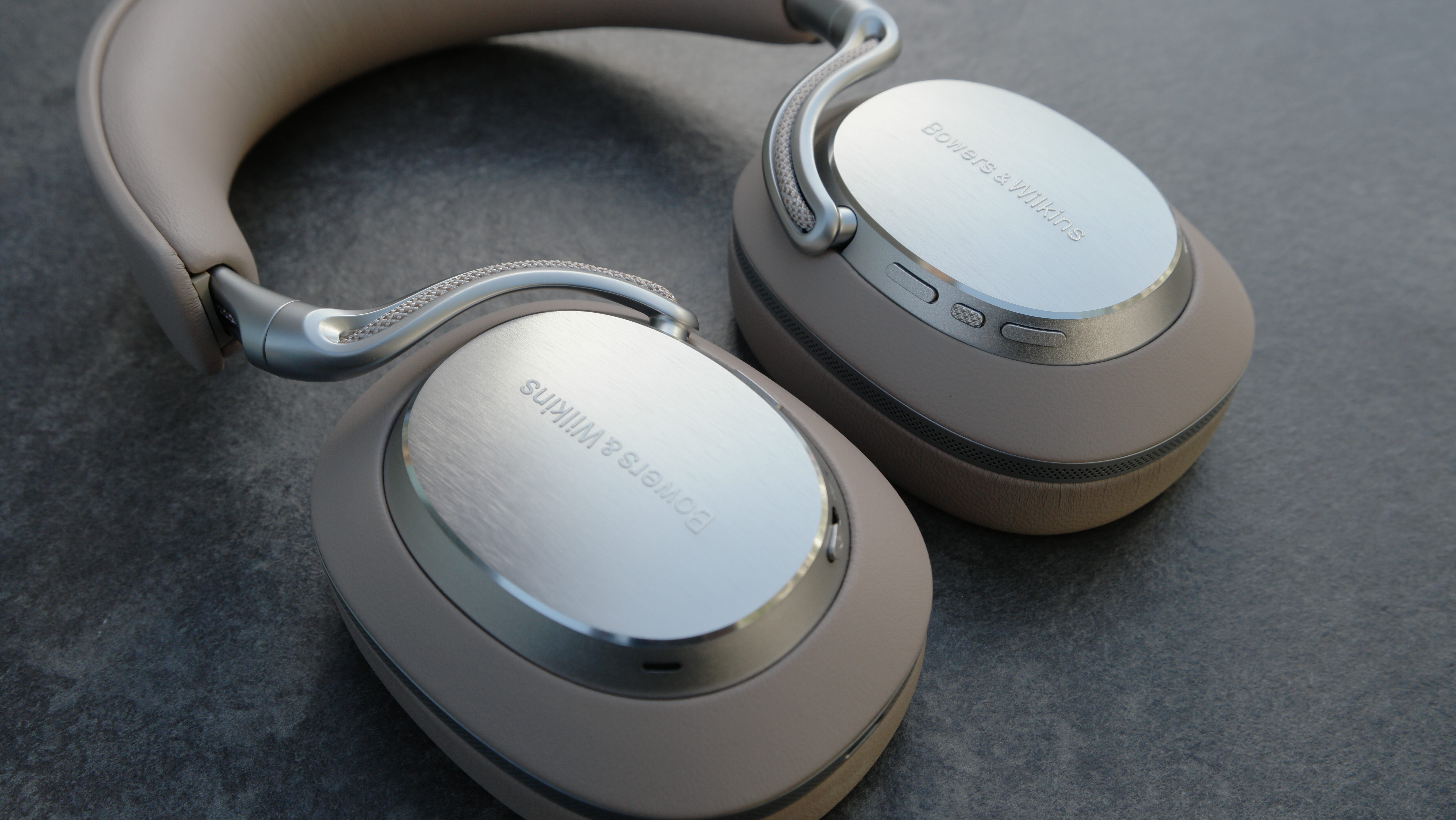HTC 10 audio testing — BoomSound evolved
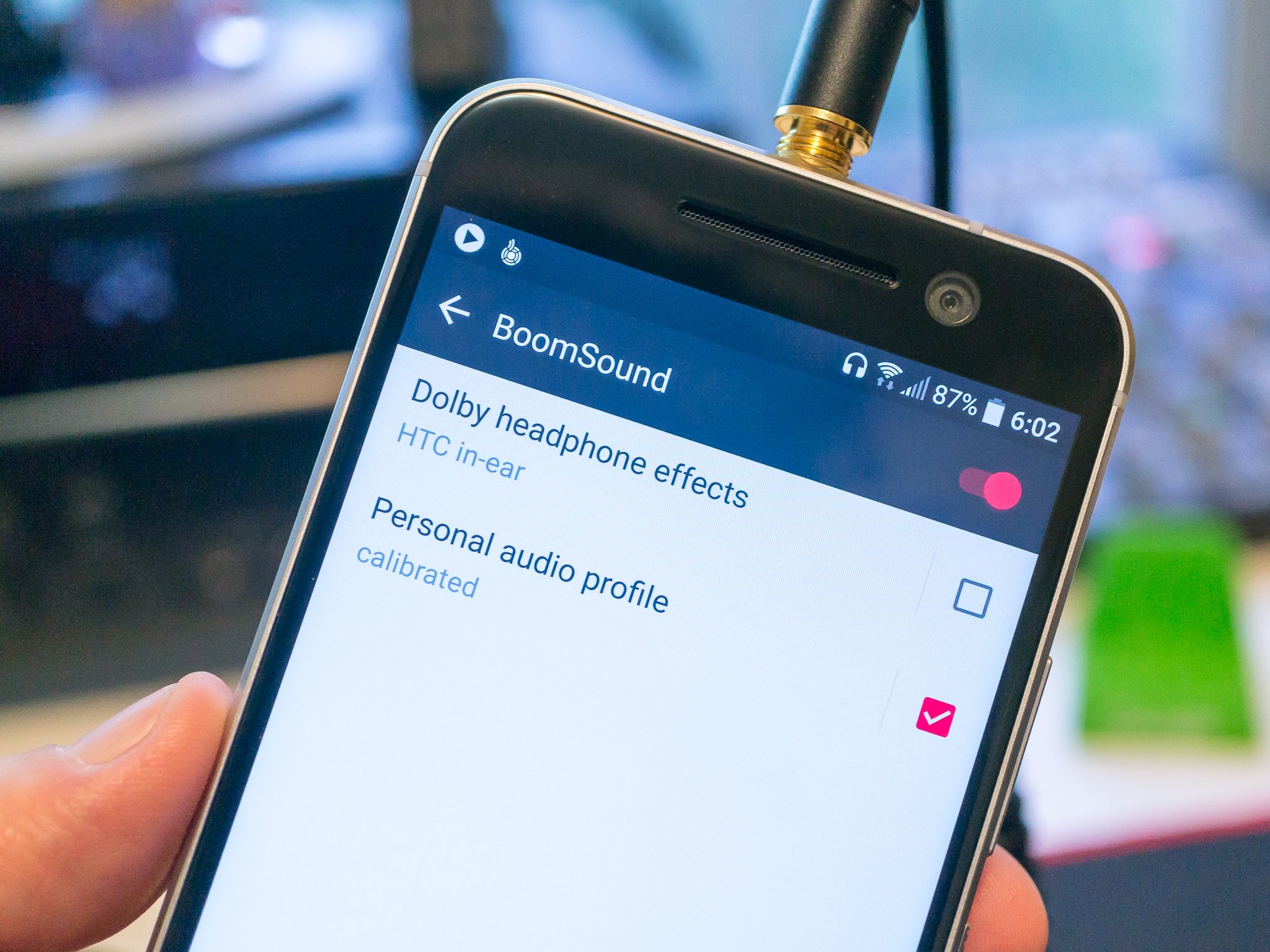
Get the latest news from Android Central, your trusted companion in the world of Android
You are now subscribed
Your newsletter sign-up was successful
When HTC first announced the HTC 10, we learned that the traditional audio setup we saw with the last few high-end models was gone. With a new external speaker configuration and a promise of better audio tweaks for listening through both the speakers and with headphones, we weren't quite sure what to expect. I've got some really good news — the new BoomSound is the best BoomSound. And I don't mean just the outside speaker configuration.
The HTC 10 speakers
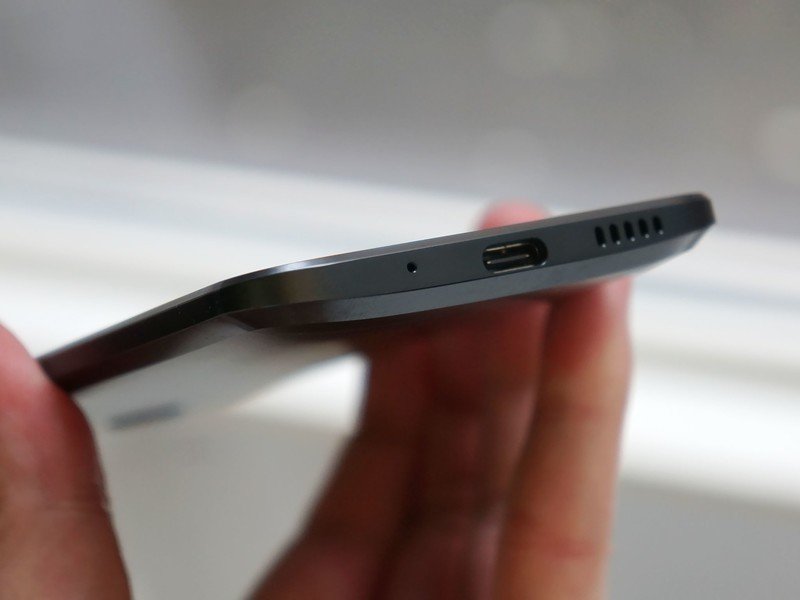
The HTC 10 uses a new speaker configuration where a full range speaker is placed at the top of the phone (where the earpiece is positioned) and a bottom firing speaker for lower frequency sounds. This means things aren't as loud as previous models that had two front-facing speakers, but the tone is better balanced and has more separation. It's the same idea as putting a subwoofer behind the couch or under your desk while having full-range speakers pointed towards your ears.
If you liked the old BoomSound speakers, you'll probably like the new BoomSound speaker setup even more
HTC gives you two software modes for BoomSound when using the built-in speakers — Music mode and Theater mode. These do a decent job of emulating 2.1 channel and 5.1 channel audio, and flipping between the two you can hear the "spatial" difference. Theater mode sounds like you're using three other speakers placed around you, firing from different angles, while Music mode is more of a straight blast out of the front of the phone. In both modes, the bottom-firing speaker isn't a problem and you'll need to physically block the speaker port to muffle it.
Let's be clear here — I still think music played through tiny electronic speakers with no travel and a very limited cabinet still sounds horrible. But the new BoomSound is far less horrible than the distorted loud sounds that came from phones like the M9 with two full range front-facing speakers. A good part of this is because the volume is more limited and has better adjustment, and the system itself responds very well to tone and equalizer adjustments from your music player. The speakers also do a pretty good job while watching video, because the separating makes dialog and speech sound more clear.
If you liked the BoomSound speakers on HTC's prior phones, you'll probably like the new BoomSound speaker setup even more. I certainly do.
Headphone audio
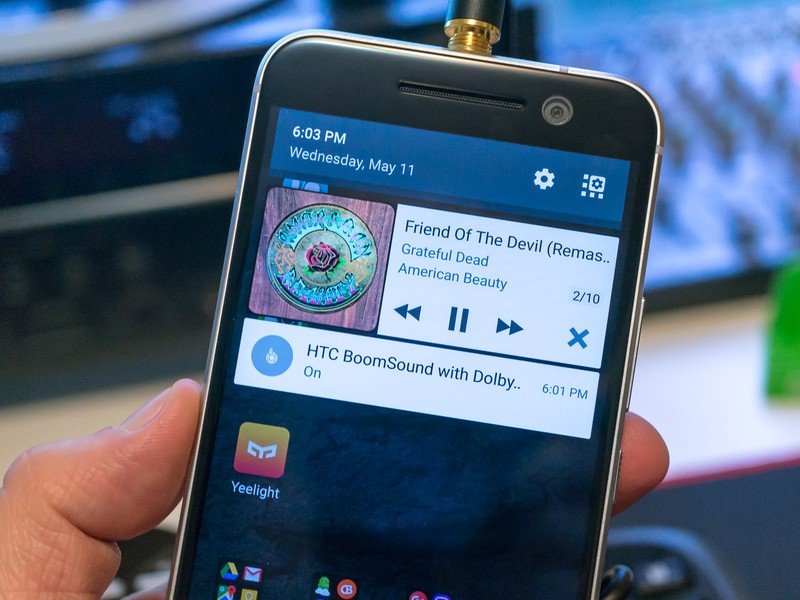
I was very skeptical of HTC's claims of excellent headphone audio on the HTC 10. Not only was I surprised at the results of both audio benchmarking and listening, but I found out my skepticism (as well as most everyone else with the same concerns) was unfounded.
The HTC 10 uses a stand-alone DAC as well as headphone amp
Qualcomm's Snapdragon 820 does a lot of things right, but clear audio isn't one of those things. Something in the digital to analog converter circuit introduces an extreme amount of noise and crosstalk into the analog output, and phones like the U.S. Galaxy S7 and LG G5 sound pretty poor because of this. After doing some testing, I was presented with results that just didn't make sense from the HTC 10 — it was better than it should be, even with extra work and attention to the analog circuit that brings signal from the DAC output to the headphone jack. You can only do so much magic to a bad signal. I asked HTC how they did it, and found out that some assumptions about the HTC 10 audio hardware that the internet (and myself) has are incorrect. The HTC 10 uses a stand-alone DAC as well as headphone amp and isn't using the Snapdragon 820 DAC. This is pretty important, and why the HTC 10 sounds as good as it does.
Get the latest news from Android Central, your trusted companion in the world of Android
We use a discrete DAC (not one on the SoC) in addition to the amp and have done a ton of PCB engineering to insure the best possible signal-to-noise ratio. Credit to HTC engineering, not off-the-shelf components.
So much for relying on the internet. That's a mistake I won't make again.
Needless to say, the results of my benchmark testing with the HTC 10 are pretty damn outstanding.
| Category | Base testing equipment | HTC 10 | legend |
|---|---|---|---|
| Frequency response | +0.00, -0.00 | +0.02, -0.03 | closer to zero is better |
| Noise | -146.4 | -94.4 | lower/further from zero is better |
| Dynamic Range | 133.2 | 94.1 | higher is better |
| Total Harmonic Distortion | 0.0000 | 0.0044 | closer to zero is better |
| Intermodulation Distortion + Noise | 0.0002 | 0.0088 | lower is better |
| Stereo Crosstalk | -147.8 | -91.0 | lower/further from zero is better |
Let's explain what you're seeing here for those folks who aren't doing audio benchmarks. The first column is the testing parameter. The second column is the audio equipment I'm using to benchmark the HTC 10 — the equipment itself will inject it's own noise and distortion into the software, and knowing how much and where is important. The third column is the result from the HTC 10, and the fourth column tells you how the numbers should look. Also, remember that -100 is a lower number and further from zero than -90 or nothing here is going to make sense.
It's worth noting that my testing equipment shows as "perfect" in some tests, but that only means the software used isn't able to find the flaws. Hooked up to a scope or more sensitive (and expensive) audio testing hardware, it would show a much different picture. What's important is that it is better than the devices being tested.
For folks who would like to perform their own audio hardware benchmarking or talk about the equipment used we can discuss that in the forums. It's pretty fun, but a bit more complicated than something I'd want to write in a blog post.
The ultimate Android phone audio benchmarking thread
I can make it easy for those who aren't quite sure what words like crosstalk or harmonic distortion mean — the HTC 10 audio hardware scores as good or better than the LG G5 with the B&O HiFi audio module installed, and there is little discernible difference when compared to the LG V10 — a product that most agree offers some of the best audio hardware available in a phone. On the hardware side, the HTC 10 will satisfy almost anyone, and the RightMark Audio Analyzer studio gives every category an "excellent" rating. So do I.
Listening tests
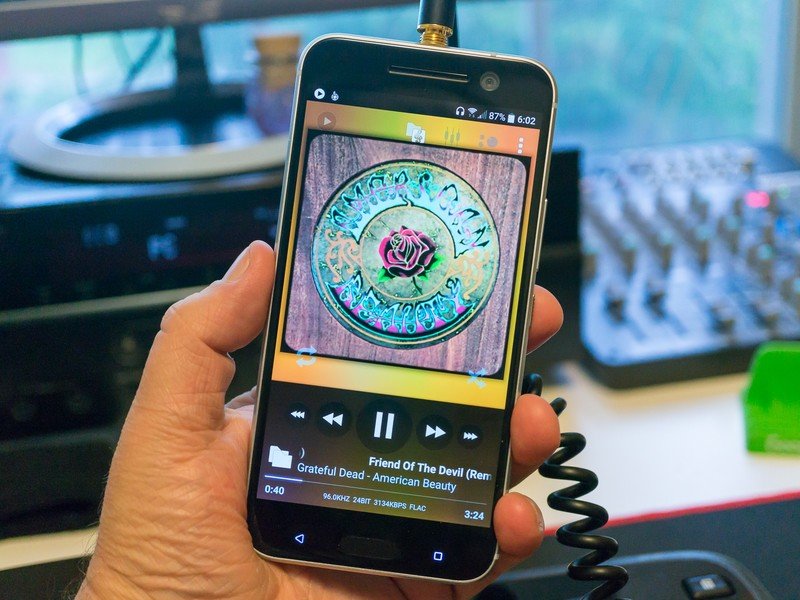
Benchmarking audio hardware is just like benchmarking any other hardware — it only tells part of the story, and often does even that poorly. As an example, the HTC M9 spat out numbers better than the HTC M8, but most audio nerds would say the opposite was true and the M8 had a much better sound. What's important is how it actually sounds through your favorite headphones. (Spoiler: it sounds good. Damn good)
I installed PowerAmp, loaded some of my favorite HQ FLAC files (24-bit/48kHz or higher) and used my favorite mobile headphones — the Sony MDR-7506 studio model. I then kicked back and played some music for a bit while the wife and dogs were out having fun. As expected, the results were great.
Benchmarks only ever tell part of the story, and often poorly
Part of the equation here is what happens the first time you plug a pair of headphones in. The HTC 10 allows you to set a personal audio profile, and let's you do it by actually listening to reference tones if you like. You start the calibration, adjust things until you hear the sounds (both low and high frequency) then save it. You can choose this audio profile in tandem with HTC's Dolby effects, or choose one or the other. I choose my own profile but didn't apply the Dolby effects.
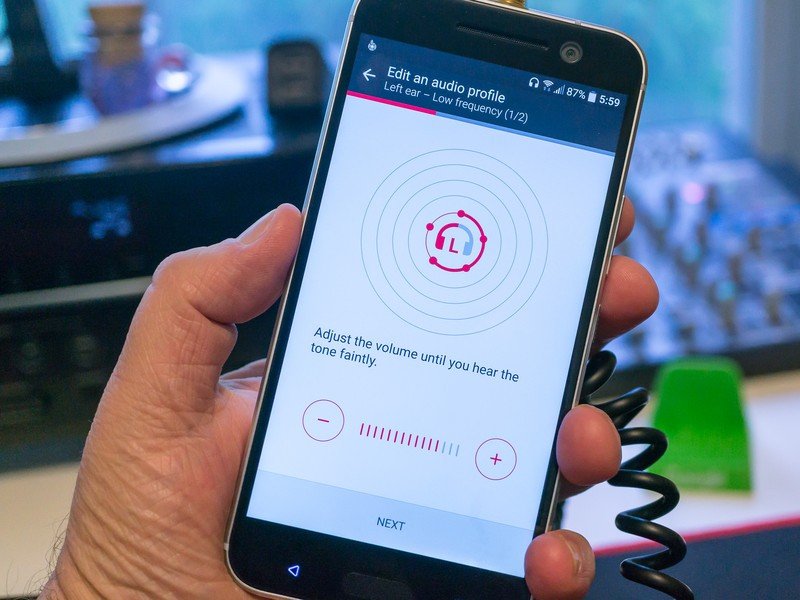
Of course, you can also do this with your own reference tones and an equalizer, and maybe get even better results if you know what you're doing and don't mind spending the time doing it. But the way HTC does it is simple and still very effective — especially if you want to use "flat" sounding headphones and adjust things to your liking by hand. Which I do. After setting things up, I made sure any eq and tone adjustments in PowerAmp were shut off and just listened.
In my experience, the HTC 10 is a really good music player
All the music I tested — old "classic" Country and Western, heavy Rock and Metal, Classical and golden age tunes from Sinatra and the like as well as remastered songs from the '70s sounded great. Music sounded clear, with little to no distortion even at the highest levels, background noise was almost non-existent and the separation (hearing each tone and frequency without them blending together) was really nice. Even testing with a self-generated 30 seconds of silence or a track with quiet single instrument portions has no hiss or noise to drive me crazy. It's not perfect audio, but that's something I've never been able to experience from a handheld player (or any home audio equipment I can afford to buy). I'm sure someone out there can find fault with it, but in my experience it's every bit as good a music player as the V10.
If you're thinking about buying an HTC 10 and great audio is on your short list of must have features, you're good to go. If you already have an HTC 10, go ahead and snag a good pair of headphones and fill your SD card with some hi-res music files — you'll like what you hear.

Jerry is an amateur woodworker and struggling shade tree mechanic. There's nothing he can't take apart, but many things he can't reassemble. You'll find him writing and speaking his loud opinion on Android Central and occasionally on Threads.
